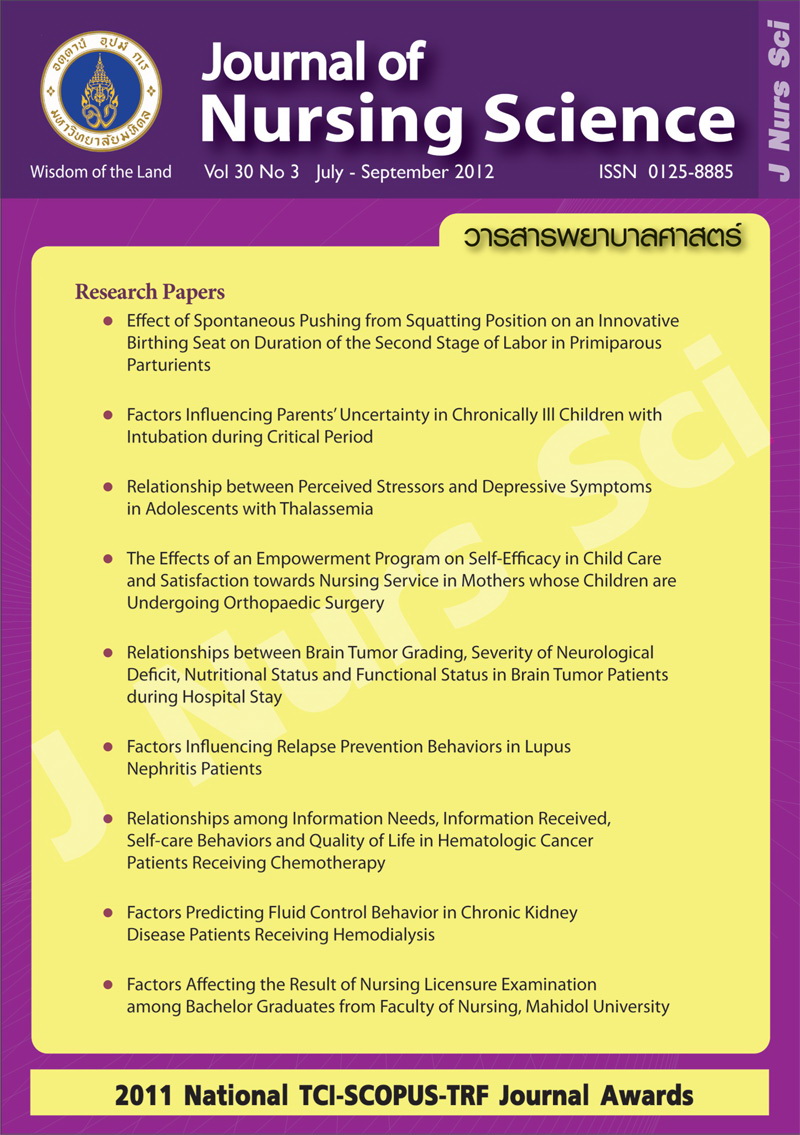Factors Influencing Relapse Prevention Behaviors in Lupus Nephritis Patients
Main Article Content
Abstract
Purpose: This study was to determine the influence of knowledge about the disease, perceived barriers to action, social support and perceived symptoms of the disease on relapse prevention behaviors in lupus nephritis patients.
Design: Correlational predictive design.
Methods: The participants consisted of 100 lupus nephritis patients who received treatment at the Out-patient Department of Siriraj Hospital. Data were collected using five questionnaires on demographic data, knowledge about lupus nephritis, perceived barriers to action, social support, and relapse prevention behaviors in lupus nephritis patients. Multiple regression was used for the data analysis.
Main findings: The findings showed that knowledge, perceived barriers to action, social support, and perceived symptoms of the disease could explain 19.8% of the variance of relapse prevention behaviors in lupus nephritis patients (R2 = .198, p < .05). The factor most influencing relapse prevention behaviors when controlling for the other variables was social support (β = .241, p < .05), followed by knowledge about the disease (β = .213, p < .05). Perceived barriers to action and perceived symptoms of the disease did not significantly influence relapse prevention behaviors in lupus nephritis patients.
Conclusion and recommendations: it is recommended that nurses should provide variety of support and knowledge about the disease to the patients with lupus nephritis to maintain more accurate and suitable relapse prevention behaviors.
บทคัดย่อ
วัตถุประสงค์: เพื่อศึกษาอิทธิพลของความรู้เกี่ยวกับโรค การรับรู้อุปสรรคต่อการปฏิบัติพฤติกรรม การสนับสนุนทางสังคม และการรับรู้อาการของโรค ต่อพฤติกรรมป้องกันการกำเริบของโรคในผู้ป่วยไตอักเสบลูปัส
รูปแบบการวิจัย: การศึกษาหาความสัมพันธ์เชิงทำนาย
วิธีดำเนินการวิจัย: กลุ่มตัวอย่างเป็นผู้ป่วยไตอักเสบลูปัส ที่เข้ารับการตรวจรักษาในคลินิกโรคไต แผนกผู้ป่วยนอก โรงพยาบาลศิริราช จำนวน 100 ราย เก็บข้อมูลโดยใช้แบบสอบถามจำนวน 5 ชุด ประกอบด้วย แบบสอบถามข้อมูลส่วนบุคคล แบบสอบถามความรู้เกี่ยวกับโรค แบบสอบถามการรับรู้อุปสรรคต่อการปฏิบัติพฤติกรรม แบบสอบถามการสนับสนุนทางสังคม และแบบสอบถามพฤติกรรมป้องกันการกำเริบของโรคในผู้ป่วยไตอักเสบลูปัส วิเคราะห์ข้อมูลโดยใช้การวิเคราะห์ถดถอยพหุคูณ
ผลการวิจัย: ปัจจัยทุกตัวที่ศึกษาสามารถร่วมอธิบายความผันแปรของพฤติกรรมป้องกันการกำเริบของโรคในผู้ป่วยไตอักเสบลูปัสได้ร้อยละ 19.8 (R2 = .198, p < .05) โดยปัจจัยที่สามารถทำนายพฤติกรรมป้องกันการกำเริบของโรคในผู้ป่วยไตอักเสบลูปัสได้อย่างมีนัยสำคัญทางสถิติ คือ การสนับสนุนทางสังคม (β = .241, p < .05) และความรู้เกี่ยวกับโรค (β = .213, p < .05) ส่วนปัจจัยด้านการรับรู้อุปสรรคต่อการปฏิบัติพฤติกรรม และการรับรู้อาการของโรค ไม่สามารถทำนายพฤติกรรมป้องกันการกำเริบของโรคในผู้ป่วยไตอักเสบลูปัส
สรุปผลและข้อเสนอแนะ: จากผลการศึกษาแสดงให้เห็นว่า พยาบาลควรส่งเสริมให้ผู้ป่วยได้รับการสนับสนุนทางสังคมอย่างเพียงพอ รวมทั้งการให้ความรู้เกี่ยวกับโรคที่ถูกต้อง เพื่อส่งเสริมให้ผู้ป่วยมีพฤติกรรมการป้องกันการกำเริบของโรคที่เหมาะสมต่อไป
คำสำคัญ: ไตอักเสบลูปัส พฤติกรรมป้องกันการกำเริบ
Article Details
Copyright Notice: Nursing Science Journal of Thailand has exclusive rights to publish and distribute the manuscript and all contents therein. Without the journal’s permission, the dissemination of the manuscript in another journal or online, and the reproduction of the manuscript for non-educational purpose are prohibited.

Disclaimer: The opinion expressed and figures provided in this journal, NSJT, are the sole responsibility of the authors. The editorial board bears no responsibility in this regard.


